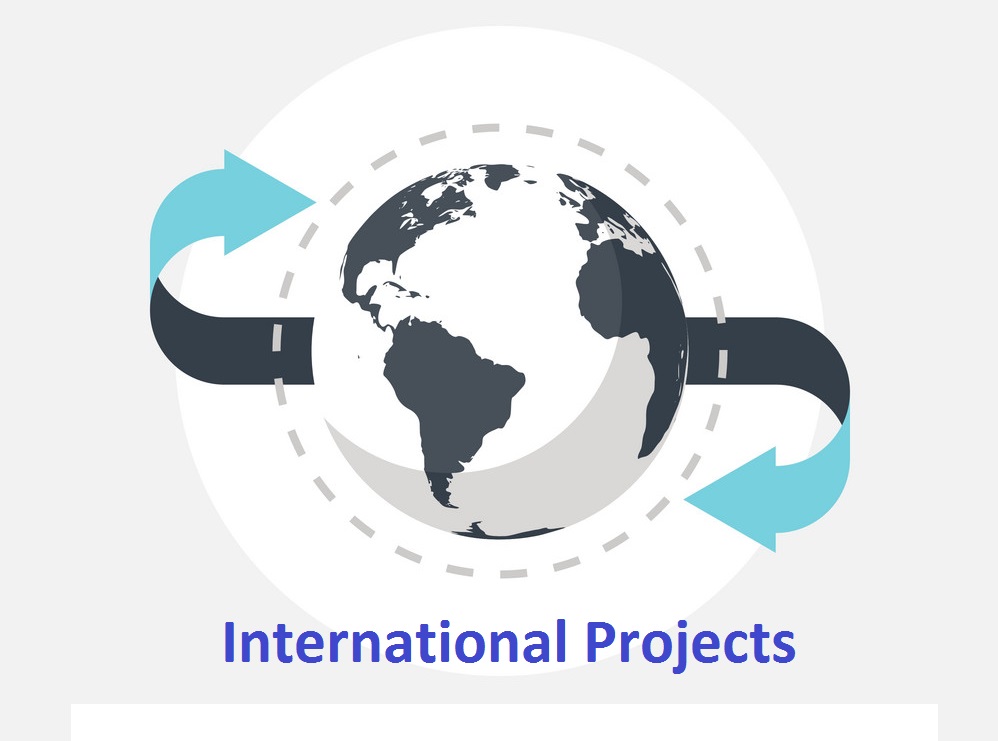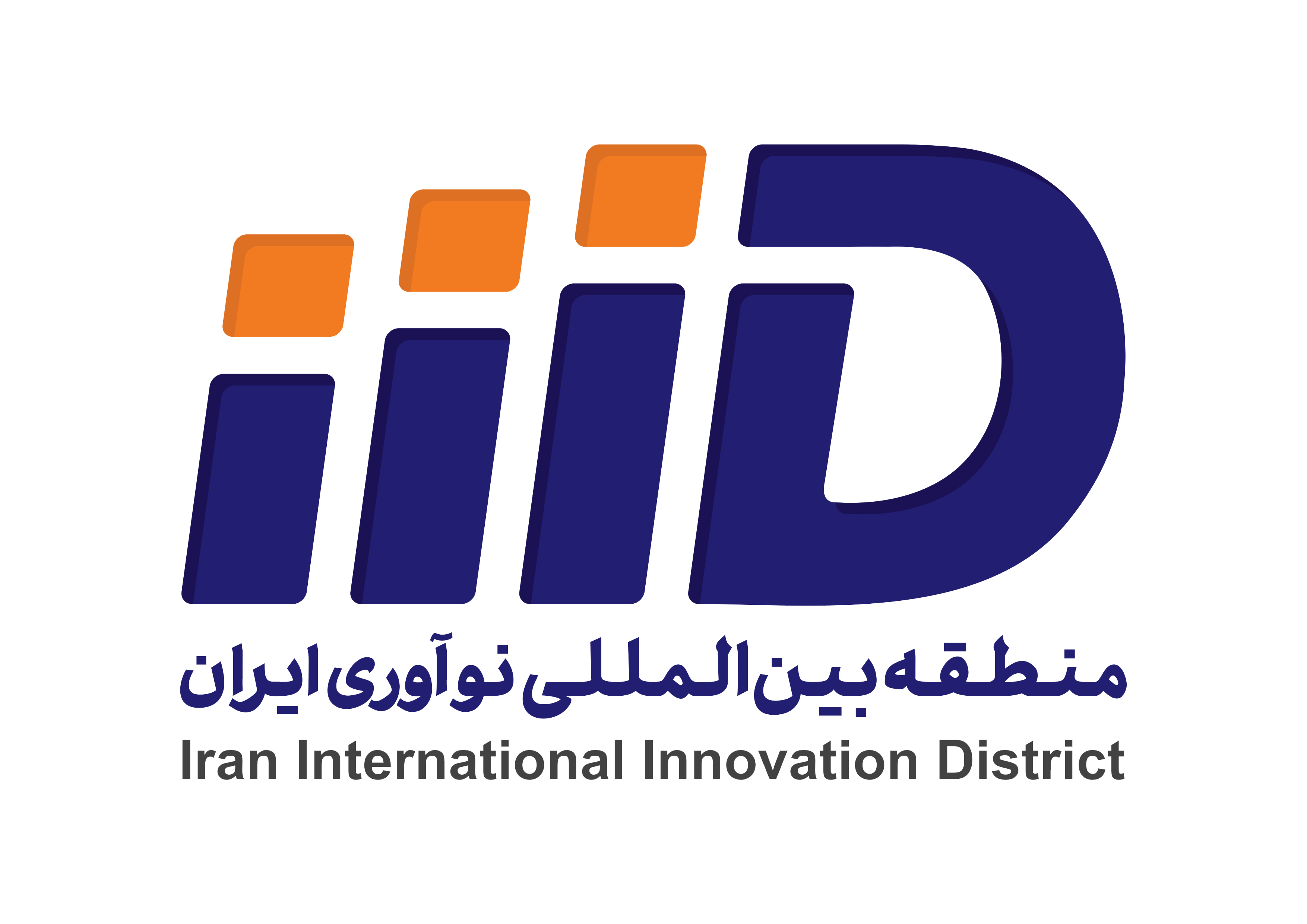International Projects

These are some of the most important international projects that are being carried out continuously in the PTP.
Most of these projects have been proposed from the beginning by the headquarter members of PTP and then designed and then implemented:

Introduction:
International Exhibitions with orientations towards science and technology, act like a bridge between businessmen, technologists, industrialists and researchers from different countries, which are held not only to display goods and conduct trade negotiations around them, but also to provide various information about the world-class competitive pricing, the latest quality standards, the latest industrial developments, the latest scientific research achievements and economic-technological ideas, which are exchanged during the exhibitions.

In this regard, with the efforts of Pardis Technology Park, the INOTEX international innovation and technology exhibition has been held since 2012 with the participation of international companies and to serve the following objectives:
1. Investment: Communication between domestic and international investors and startups and companies.
2. Partnership and collaboration: Between technology companies and domestic and international startups.
3. Networking and arranging meetings: Between innovation and technology ecosystem activists.
In addition to introducing state-of-the-art technologies to large and medium sized industries, INOTEX Exhibition tries to connect customers of technology products to the manufacturers of them, and also to introduces investors to investment opportunities in the field of technology projects and startups.
Nowadays INOTEX is recognized as one of the most significant events of the year in the field of innovation and technology in Iran, and has been welcomed by a wide range of audiences during these years.
From 2021, Pardis innovation district will be the host of INOTEX, and this will make INOTEX event a truly unforgettable one in the field of innovation and technology ecosystems in Iran.
#international_innovation_and_technology_exhibition
#technology_exhibition
#innovation_exhibition
#international_exhibition

- Contact INFO
Website: https://www.inotex.com/en
Telegram: http://t.me/inotexevent
Instagram: http://instagram.com/inotexevent
Aparat: http://aparat.com/inotexevent
Twitter: http://twitter.com/inotexevent

Introduction:
In order to appreciate prominent scientists and provide the ground for scientific cooperation and development worldwide, the Mustafa Prize was established in 2012 as a symbol of scientific excellence at the international level.
The Mustafa Prize, a top science and technology award, is granted biennially to the top researchers and scientists of the Islamic world in four categories: “Life and Medical Science and Technology”, “Nanoscience and Nanotechnology”, “Information and Communication Science and Technology”, and “All areas of science and technology”.
The Prize is granted to works deemed to have improved the human life, have made tangible and cutting-edge innovations on the boundaries of science, or have presented new scientific methodology.
The laureates in each category will be awarded USD 500,000/- which is financed through the endowments made to the Prize. The laureates will also be adorned with a special Medal and a certificate.
The Mustafa (PBUH) Prize was established by Pardis Technology Park focusing on identifying and introducing the best of science and technology in the Islamic world, aiming to increase the level of cooperation and synergy, paving the way for the growth and prosperity of modern Islamic civilization and creating an atmosphere of cooperation and interaction between experts and scientists.
The introduction of the award is one of the important symbols of scientific excellence in the world. This award covers the fields of communication and information science and technology, biotechnology and medicine, nanotechnology and all fields of science and technology.
The Mustafa Prize was praised by the Ministers of science of the Islamic Countries in 1395 in the 15th General Assembly of the Organisation of Islamic Cooperation's (OIC) Standing Committee on Scientific and Technological Cooperation for the promotion and cooperation of science and technology activities among the OIC member states (COMSTECH).
The Science Magazine has also termed this award as the Islamic Nobel.

- Information and communication science and technology
- Biology and medical science and technology
- Nanoscience and technology
- All fields of science and technology
- Selection and evaluation steps

- Steps for selecting and evaluating works:
Prestigious works submitted to the Prize Secretariat will be evaluated and judged in specialized scientific groups approved by the scientific working group, and the works qualified will be examined in the presence of prominent international scientists.
The top works will then be introduced to the Mustafa Prize policy making council for approval and then publicly announced.
Selected works should be both innovative and original and should have a significant impact on the welfare, security and health of humanity in the form of specific applications and tangible results, and expand the frontiers of knowledge.
The owner of the work should also have a good scientific and public reputation.

- Criteria for selection and evaluation
The Mustafa Prize (PBUH) secretariat considers the following items to select its winners:
- Significant characteristics of the work:
The assessment committee of the prize first evaluates the general features and qualifications of the “works” and then sends the selected ones to the scientific committee.
Submitted works should not have been awarded any other international prizes.
In the final step, a group of seven high-profile researchers and academics examine the works and select one according to the following criteria:
- Distinctive features of the work
The work should be notably innovative and outstanding; it should have specific applications and tangible results with reasons specified for its significance.
- Influence of the work
The work should have already resulted in advancing the frontiers of knowledge; it should also have had a great regional or global impact. Its results should have been published either in the form of a scientific theory or should have potential for production and wealth generation. Moreover, it should have a visible impact on the economy, culture, society, health, environment, and/or public welfare. The work should also have a share in addressing scientific and technological needs and solving social problems.
- Owner of the work
The owner of the work (nominee) should have a high scientific profile and good reputation. This manifests itself in the number and quality of his/her publications, innovations, patents, etc. The nominee should also have an innovative and holistic scientific spirit.
For more information please check the website:
https://mustafaprize.org

D-8 Technology Transfer and Exchange Network
Introduction:
D-8 Technology Transfer and Exchange Network is an informative and transaction-enabled network to be set up among the Eight Developing Muslim Countries.
In the wake of holding the third meeting of industry ministers and the seventh meeting of senior experts of the D-8 in 1391 in Dhaka, Bangladesh, the D8 Technology Transfer and Exchange Network (TTEN) proposal was presented by Pardis Technology Park and it was approved by the countries and finally the industry ministers of this group in the technology working group.
Based on the approval Pardis Technology Park as Iran's representative and as the secretariat of D8TTEN, has been responsible for providing the infrastructure for establishing this network, and while holding the first meeting of the high council (consisting of the D8 Secretary General, ambassadors of member states and representatives of eighth member countries, etc.) in 1392, in Tehran, the network officially started work and its portal (www.d8tten.org) was unveiled.
D8TTEN is an information and exchange network between Indonesia, Iran, Bangladesh, Pakistan, Turkey, Egypt, Malaysia and Nigeria, which is responsible for maintaining technology convergence and synergy between member states in the field of technology through capacity building and informing about achievements and needs of technology and organizing technology exchanges.
The document introduces the vision, goals, missions, duty descriptions, actions, programs and network organization for the destination countries.
Pardis Technology Park hopes that with D-8 Network success, it will be able to develop its activities among the Islamic countries that have the greatest potential for cooperation.
Vision:
Creating the largest platform for technology transfer and exchanging knowledge-based products between the network's destinations aiming to develop technology exchanges.
Goals:
- Creating, developing and reinforcing a network of technology partners among member states;
- Supporting technological cooperation between the member D-8 member states
- Creating opportunity, synergy and capacity building by the private and public sectors in various fields of technology;
- Preparing the ground and planning for developing technology market and technological products.

- Holding D8 High Council governmental representatives annually;
- Holding related business events in all fields;
- Holding workshops and related training courses for countries;
- Creating a comprehensive website for the network, including the latest news and showcasing the achievements of countries;
- Creating a comprehensive database of network contacts in countries;
- Creating a comprehensive database of the audiences
- Planning to provide financial and credit development facilities for technology transfer contracts;
- Maintaining contact with representatives and activists

- Following up appointment of government representatives from relevant (focal points);
- Communicating with associates through phone, email, social media and mail;
- Determining annual plans for each year;
- Formation of the D8-TTEN high council, control council and internal meetings of the Secretariat throughout the year;
- Informing focal points and network database audiences of the programs;
- Inviting individuals and legal entities from related countries to attend events;
- Planning and coordination for hosting and holding the D8-TTEN high council in the specified country;
- Planning and helping hold network business events (determining the host and the scope, inviting companies, etc.);
- Corresponding with D-8 and other related institutions regarding network activities;
- Planning to finance network activities each year;

D8-TTEN activities carried out by the secretariat in the past years are as follows:
- Initial presentation of the plan in the 4th meeting of the D-8 senior industry experts in Bali, Indonesia
- Presenting the revised plan in the 5th meeting of senior industry experts in Tehran
- Re-presentation of the plan at the 6th Summit of Senior Experts in Istanbul, Turkey
- Approving the proposal (D8 TTEN) at the third meeting of industry ministers in Dhaka, Bangladesh
- D8-TTEN briefing session for ambassadors of member states
- Holding the first meeting of the D8-TTEN High Council in Tehran
- The first brainstorming session on transfer of knowledge and expertise among the member states of the Organization of Islamic Cooperation focusing on D8-TTEN in the presence of Islamic Development Bank, COMSTECH, Statistical, Economic and Social Research and Training Centre for Islamic Countries (SESRIC), Presidential Center for Progress and Development and D8-TTEN Secretariat in Turkey.
- The second brainstorming session on transfer of knowledge and expertise among the member countries of the Organization of the Islamic Conference" focusing on D8-TTEN in the presence of Islamic Development Bank, COMSTECH, Statistical, Economic and Social Research and Training Centre for Islamic Countries (SESRIC), Presidential Center for Progress and Development and D8-TTEN Secretariat in Iran
- Presence of eight technology owners from D-8 member countries in the Jeddah Innovation Exhibition on the sidelines of the 40th anniversary of the Islamic Development Bank in line with brainstorming sessions to receive financial support from the Islamic Development Bank to transfer these technologies to OIC member states
- Holding the first meeting of the D8-TTEN advisory council in the presence of experts in the field of science and technology
- Preliminary measures to transfer Halal gelatin technology from Iran to Turkey
- Second meeting of the D8-TTEN supreme council in Nigeria
- Approving granting award for the best technology transfer between the D8 and OIC member states in the 2nd high council meeting
- Participating in the meeting of the technology cooperation working group of the 4th Meeting of industry ministers of the D-Eight Member States
- The 3rd high council of the D-8 TTEN in Malaysia
- International workshop on technology transfer for D-Eight member states
- Granting award for the best network technology transfer in 2015
- The Fourth D-8 TTEN high council and the first business-technology meeting in the field of biosimilar drugs
- The 1st Technology Investment Meeting (TIM) in Tehran
- The 2nd Technology Investment Meeting (TIM) in Tehran

Creating the opportunity to introduce the products and services to other member states and the possibility of showcasing their supply and demand by creating a supply and demand bank for technology and matching them for the supply and demand parties of technology through communication with D-8 TTEN secretariat.
Informing the D-8 TTEN latest news and activities and those of the member states in the field of technology and innovation
Creating a separate page to introduce each country and its capacities as well as its focal point contact information.

Meetings of the high council are held in the presence of member states for decision-making, presentation of solutions and policies for developing technological activities in the countries by the representatives of the governments.
During each event, a report on the activities of countries for technology development is presented to other countries and experiences and the latest developments are shared.
Meanwhile, each event has side events for technology companies from different countries.
The council consists of D-8 secretary general, president of Pardis Technology Park, Bangladesh Council of Scientific and Industrial Research, Egypt, Academy of Scientific Research and Technology (ASRT), Innovation development office of the Indonesian Ministry of State for Research and Technology, Iran National Techmart, Malaysia Ministry of Science, Technology and Innovation office for commercialization and technology transfer, National Centre for Technology Management (NACETEM), Pakistan Engineering Development Board and Scientific and Technological Research Council of Turkey.

Launching and creating various mechanisms and events for developing product sales and technology exchange between member states, such as attending exhibitions, holding B2B meetings and other solutions by the secretariat and with the help of countries are on the agenda of the secretariat programs.

Granting award for the best network technology transfer among Islamic states, supporting the presence of countries in workshops approved by the secretariat, offering discounted stalls in technology exhibitions of countries and other issues for which planning will be possible.

The D8 TTEN was launched in Dhaka, Bangladesh, based on the approval of the third D-8 Ministerial Meeting of Industry, and its secretariat was established in Pardis Technology Park.
It is aimed at developing cooperation between member states in the field of technology exchange and attracting advanced technologies, as well as moving towards a knowledge-based economy.
Accordingly, the plan to grant "Technology Transfer Award" with the financial support of the Iranian Government Iran and with the help of Pardis Technology Park (D8 TTEN Secretariat), was approved by the members during the second meeting of the high council of the network in Nigeria in 2015 aiming to encourage D-8 member states to participate in the technology exchange process.
Based on the plan's regulations, the best technology transfer case between at least one of the D-8 member states and other Islamic countries will be granted an award worth $ 5,000 and a plaque of honor.
The vision of the award organizers is to establish further participation and interaction between technology companies in the Islamic countries, and we hope that by granting this award and increasing it in the future, we can influence the growth of technology transfer and technical knowledge among Muslim states.
The conditions for granting the award are as follows:
- A technology transfer agreement has been signed between the two parties
- One of the parties is from the D-8 countries and the second one is from the Organization of the Islamic Conference (OIC) member states.
- The contract focuses on one of the methods of technology transfer and is not related to product sales.
Criteria for evaluation and granting award also include the capabilities of the technology supplier, contract value (financial volume), technology transfer process, technology transfer method and the rate of capital return for technology recipient.

In order to develop technology transfer and market of technological products, the issue of holding purposeful meetings was raised by the secretariat through determining the specific area required by countries and its implementation method and content and framework were designed.
The meetings are based on the fact that the necessary area is first determined by the host and the representative or focal point of the network in that country.
Then after confirming the generalities and details of the issue, companies and activists are invited to visit the host country to attend the business meeting and to negotiate with their analogous companies in other countries to achieve joint cooperation ground.

One of the tools for creating an understanding between technology transfer policy makers in D-8 member states is to hold a workshop aimed at strengthening the network secretariat and the country in general in international technology diplomacy, as well as identifying investment opportunities in the technology ecosystem.
Holding a workshop is based on the importance of promoting the following items:
- Promoting the knowledge of member states in the field of technology transfer and exchange and the way to facilitate it.
- Promoting the international status of Pardis Technology Park as a D8-TTEN secretariat
- Promoting Iran's position as an active country in science and technology and a member of the D-8 Organization for Economic Cooperation
Iran National Techmart as the focal point of the Islamic Republic of Iran in D-8TTEN has put on its agenda holding an international technology transfer workshop as one of the articles of Iran's executive plan for 2016, by approving it in the third session of the high council, is on the agenda.
This workshop was held in the presence of professors from a capable French group and representatives of member states and a group of experts and activists in science and technology policy from Iran.

Thanks to the role of Pardis Technology Park in the scientific development of the country and its close relationship with knowledge-based companies and venture capitalists who are the audience of this project and on the other hand, the D8-TTEN secretariat management between the member states by Pardis Technology Park, holding an international meeting with the participation of international activists of risky funds was put on the agenda to define cooperation and synergy and the formation of strong networks of venture capitalists as part of the process of strengthening technology companies to transfer technology and to meet the needs of countries of their potential and actual capacity.
The first D-8 technology investment meeting was organized by Pardis Technology Park as the secretariat of D8-TTEN in 1396 and the second round of this meeting was held in February 1398 in Pardis Technology Park conference hall.
Technology Investment Meeting (TIM) is an opportunity to identify investors from member states and other Islamic countries in the first step to maintain synergy between activists, and then with the cooperation of funds and investment companies and entrepreneurs and innovative start-ups set a long-term goal of investing in innovative and technological designs.

Scientists’ Garden of Pardis Technology Park
The project of erecting busts of the world scientists and technologists in "Scientists’ Garden” at Pardis Technology Park (PTP) is a project aimed to value the efforts and endeavors made by the well-known scientists of Iran and the world. This project, which has been commenced in 2007, is under performance by the management of the park and in association with the Ministry of Foreign Affairs.
Based on this project, a monument will be made and dedicated to each scientist or researcher, either contemporary or in the past time, who has served the human beings with fruitful efforts in the field of knowledge, while has brought pride and honor for his country. The monument will be erected in the Scientists’ Garden in PTP and will unveil at the presence of the officials and scientists of the related field.
 |
|
Prof. Viktor Amazaspovich Ambartsumian |
|
Viktor Amazaspovich Ambartsumian (1908 –1996) was a Soviet Armenian astrophysicist and science administrator. One of the 20th century's top astronomers, he is widely regarded as the founder of theoretical astrophysics in the Soviet Union. Educated at Leningrad State University (LSU) and the Pulkovo Observatory, Ambartsumian taught at LSU and founded the Soviet Union's first department of astrophysics there in 1934. He subsequently moved to Soviet Armenia, where he founded the Byurakan Observatory in 1946. It became his institutional base for the decades to come and a major center of astronomical research. He also co-founded the Armenian Academy of Sciences and led it for almost half a century—the entire post-war period. One commentator noted that "science in Armenia was synonymous with the name Ambartsumian." In 1965 Ambartsumian founded the journal Astrofizika and served as its editor for over 20 years. Ambartsumian began retiring from the various positions he held only from the age of 80. He died at his house in Byurakan and was buried on the grounds of the observatory. He was declared a National Hero of Armenia in 1994. |
 |
|
Prof. Seyed Hussain Mirshamsi |
|
Father of vaccines in Iran, after graduating in the field of veterinary science from Tehran university in the years 1950-1951, he received his Ph.D. in the veterinary field from Alfred university affiliate to Paris university of veterinary. He also graduated from New York health Institute in the field of virology and from then on, he joined the London Medical Research Council taking part in a research work for producing vaccines for measles, polio, mumps, and pox. As representative of World health Organization, he was responsible for operating vaccine production line in different countries such as Jordan and Tunisia in the Middle East working in the biologic standardization committee affiliated to WHO |
|
|
|
Joseph Hooton Taylor Jr. (born March 29, 1941) is an American astrophysicist and Nobel Prize laureate in Physics for his discovery with Russell Alan Hulse of a "new type of pulsar, a discovery that has opened up new possibilities for the study of gravitation." |
|
Prof. Acharia Jagdish Jandra Bose |
|
Jandra was graduated from Calcutta University, India and later continued in London University studying medicine. After some while, he abandoned his studies due to illness but continued his research in Cambridge with Lord Rilly the Nobel Laureate. He later returned to India and taught physics at Calcutta University. He developed a coherer device which was for radio waves. Moreover, he is renowned for his activities in radio invention and communication and biophysics. The World Association of Electronic and Electricity Engineers have named her as the pioneer of radio science. He is also known as the father of sci-fi in Bengal. He is the first from India peninsular to have acquired a US patent in 1904 |
|
Prof. Mohammad Gharib |
|
Father of Pediatrics in Iran is among the first physicians who specialized as the pediatrician in Iran and was the founder of the modern pediatrician as well as the founder of a special hospital for children. In 1917 Dr. Gharib went to France to continue his studies in medicine and he returned home in 1928 working as a professor in Medical College of Tehran University. Later he opened pediatrician college and remained its chancellor for the rest of his life. He co-founded a pediatrician center with Dr. Hassan Ahari as the first ever children’s hospital in Iran which is one of the most important scientific attempts in his life. He was awarded the top medal for his highly valuable services and the first rank medal from Ministry of Education as well as the medal of Legion d’Honeur from the Government of France |
|
Prof. Gholamhussein Mosaheb |
|
The celebrated and distinguished Iranian mathematician was born in Tehran in 1911. His undergraduate studies in mathematics were conducted in Tehran and Paris (1928-31) and he obtained his Ph.D. in mathematics from Cambridge University in 1948. Three colossal and everlasting achievements of Dr. Mossaheb which keep his memory immortal are 1) Founding and editing the "Persian Encyclopedia”. This is the first Persian Encyclopedia written on the basis and methodology of internationally accepted norms (1955); 2) Founding and managing the "Mathematical Institute” at Daneshsarayeh Aali (1965). Many of the present professors of mathematics in Iran are the graduates of this Institute; 3) In his quest for the enrichment of the Persian language with scientific terms; he created with the collaboration of a group of noted scholars an extensive repository of scientific terminology in Persian. |
|
Prof. Omar Yaghi |
|
Jordanian Chemist and the 2015 Mustafa Prize Laureate Omar M. Yaghi was born in Amman, Jordan on 09 February 1965. He received his formal training at the State University of New York-Albany (B.S. degree, 1985), University of Illinois-Urbana (Ph.D. degree, 1990), and Harvard University (NSF Postdoctoral Fellow, 1990-92). Professor Yaghi is the James and Neeltje Tretter Chair Professor of Chemistry at University of California, Berkeley, and a Senior Faculty Scientist at Lawrence Berkeley National Laboratory. He is the Founding Director of the Berkeley Global Science Institute and serves as the Co-Director of the Kavli Energy NanoScience Institute as well as the California Research Alliance by BASF. Prof. Yaghi was selected as the Mustafa Prize Laureate in the field of Nanoscience and Nanotechnology in 2015, for his outstanding work on "Porous Metal-Organic Frameworks”. |
|
Prof. Jackie Yi-Ru Ying |
|
2015 Mustafa Prize Laureate in Bio Nanotechnology Born: 1966 Nationality: Singapore She won the prize for her outstanding contributions to the " synthesis of well-designed advanced nanostructured materials and systems”, nanostructured biomaterials and miniaturized bio-systems of various interesting applications including the development of "stimuli-responsive polymeric nanoparticles” for diabetic patients. Prof. Jackie Yi-Ru Ying won the prize for research she has made a major impact in the field of nanostructured materials through major breakthrough in the synthesis of nanoparticles, nanocomposites and nonporous materials. She has created a nano tool box that is successfully applied towards drug delivery, cell and tissue engineering, biosensors and diagnostics, pharmaceuticals synthesis, green chemistry and energy. |
|
Prof. M. Amin Shokrollahi |
|
The 2017 Mustafa Prize Laureate in Information Theory Born: 1964 Nationality: Iranian The 2017 Mustafa Prize in Information Theory was awarded to Prof. M. Amin Shokrollahi in recognition of his outstanding work on Communications: Raptor Codes. The world's most advanced forward error correction (FEC) code for data networks, Raptor codes invented by Shokrollahi in 2001, provide protection against packet loss by sending additional repair data used to reconstruct "erased" or "lost" data. Over a period of 10 years, Prof. Shokrollahi designed and implemented various versions of his Raptor codes for many different information distribution applications including video streaming and delivery of data to mobile devices. |
|
Prof. Sami Erol Gelenbe |
|
The 2017 Mustafa Prize Laureate in Information and Communication Science and Technology Nationality: Turkish Born: 1945
The 2017 Mustafa Prize in Information and Communication Science and Technology was awarded to Prof. Sami Erol Gelenbe for his pioneering research on "Modeling and Performance Evaluation of Computer Systems.” Sami Erol Gelenbe is a Turkish computer scientist, electronic engineer and applied mathematician who is a member of the Science Academy of Turkey (Bilim Academisi), and holds the "Dennis Gabor” professorship in Electrical and Electronic Engineering at Imperial College, London. After a childhood spent in Istanbul and Alexandria (Egypt), he graduated from Ankara College in 1962 and the Middle East Technical University in 1966, winning the K.K. Clarke Research Award for work on "partial flux switching magnetic memory systems". He continued at Polytechnic University (now part of New York University), earning a master's degree and a PhD thesis on "Stochastic automata with structural restrictions”. |
 |
|
Prof. Uğur Şahin |
|
Uğur Şahin (1965) is a German oncologist and immunologist. He is the founder and CEO of BioNTech, which developed one of the major vaccines against COVID-19. His main fields of research are cancer research and immunology. Şahin's family, originally from Turkey, moved to Germany when he was four years old. He grew up in Cologne and studied medicine at the University of Cologne, completing a doctoral thesis there in cancer immunotherapy. He initially remained in academia, in patient care as an oncohematology physician and conducting research at university hospitals in Saarland and Zürich. He founded a research group at the University of Mainz in 2000 and became a professor of experimental oncology in 2006. In 2001, while maintaining his position at the University of Mainz, Şahin began to engage in entrepreneurial activities, co-founding two pharmaceutical companies, in 2001 and 2008, with his partner and spouse Özlem Türeci. The second of these companies, BioNTech, together with Pfizer Inc, developed one of the major vaccines used to fight the COVID-19 pandemic in 2020. As a result of the company's increase in value, Şahin and Türeci became the first Germans with Turkish roots among Germany's 100 wealthiest people. |
 |
|
Prof. Ali Khademhosseini |
|
Ali Khademhosseini (1975, Tehran, Iran) is the CEO of the Terasaki Institute, non-profit research organization in Los Angeles, and Omeat Inc., a cultivated-meat startup. Before taking his current CEO roles, he spent one year at Amazon Inc. Prior to that he was the Levi Knight chair and professor at the University of California-Los Angeles where he held a multi-departmental professorship in Bioengineering, Radiology, Chemical, and Biomolecular Engineering as well as the Director of Center for Minimally Invasive Therapeutics (C-MIT). From 2005 to 2017, he was a professor at Harvard Medical School, and the Wyss Institute for Biologically Inspired Engineering. He is an academic entrepreneur who has made contributions in biomaterials and regenerative medicine, particular for developing hydrogels for tissue engineering and bioprinting. He has started multiple companies, including Obsidio Inc. (sold to Boston Scientific) and Omeat Inc. His studies have been cited over 115,000 times (H index = 175). Every year since 2014 he has been selected by Thomson Reuters as one of the World's Most Influential Minds. By the number of citations, he is the most cited author of in various journals in the field of biomaterials like Biomaterials, Advanced Healthcare Materials, Bio fabrication, Tissue Engineering. |
 |
|
Prof. Umran S. Inan |
|
Umran Savaş İnan (1950) is a Turkish scientist at Koç University and Stanford University in the field of geophysics and very low frequency radio science. İnan was the president of Koç University between 2009 and 2021. Inan has been active member of various organizations since 1973 and he has been awarded by many institutions so far. Besides being a member of the Institute of Electrical and Electronics Engineers (IEEE), the International Radio Science Association, the American Physical Society (APS), the Electromagnetic Academy, the Academy of Tau Beta Pi, the Sigma Xi Academy, and TUBA, İnan was also awarded by Aeronautics and Space Administration NASA with group achievement award in years 1983, 1998 and 2004. |
 |
|
Prof. Hossein Baharvand |
|
Hossein Baharvand is a distinguished Professor of Royan Institute, where he firstly joined in 1995. He received his B.Sc. in Biology from Shiraz University in 1994, and M.Sc. in Developmental Biology from Shahid Beheshti University, Tehran in 1996. He received his Ph.D. in Cell and Developmental Biology from Khwarizmi University (formerly Tarbiat Moallem University) in 2004. In 2012, he became Professor at Royan institute. He is also appointed as the head of department of Developmental Biology at University of Science and Culture (2006-jan 2018). For the first time, he generated the mouse and human embryonic stem cells (2003) and induced pluripotent stem cells (2008) in Iran. This has enabled his team to pursue many avenues of research into translational research and regenerative medicine. He is the founder and director of Royan Institute for Stem Cell Biology and Technology, where the institute is committed to cross-disciplinary partnerships and collaborations by biology, engineering, and medical academics to improve human health and life quality. Now, the institute includes 4 main departments named as Stem Cells and Developmental Biology, Regenerative Medicine, Cell Engineering and the newly established Brain and Cognitive Sciences. He has given numerous tutorials and invited talks in many congresses. He is the editor of four international books which were published by Springer (2010 and 2012) and John Wiley, USA (2015). He has published 322 international and 102 national peer-reviewed papers, as well as seven chapters in international books, seven books in Persian, and eight translated English text books into Persian. Eight figures of his peer-reviewed publications were selected as cover pages of international journals. As of March. 2018, Google Scholar reports over 8000 citations and h-index 45 to his work. He is currently the editorial board member of eight international journals (e.g., Journal of Biological Chemistry and Nature Scientific Reports). |
 |
Prof. Mohammad Abdolahad |
|
Professor "Mohammed Abdolahad" is an Iranian scientist who has many achievements in the field of diagnosis and treatment of malignant diseases, including cancer. Among his most important achievements are the creation of a cancer detection device, a tumor detection device, etc. Abdolahad's research path is mainly focused on cancer. He has made a great contribution in applying interdisciplinary topics in the society. In recent years, Abdolahad has received US patents for many of his inventions. Together with his team, he has invented the cancer diagnostic test (PDC). PDC or device for detecting infected areas and lymph nodes involved in breast cancer is a real-time diagnosis system that is used as a complementary tool, along with frozen and permanent pathologies, to detect high-risk cancer cells in cancer areas of patients undergoing breast cancer surgery. Another of Abdolahad 's inventions is the tumor diagnosis test (IPDT) device, which helps the radiologist to find out the condition of the mass in the patient's breast and the level of risk for the patient. With this technology, you can quickly notice the beginning of the malignant process in the tumor, and in fact, this device helps the radiologist to detect any mass that needs surgery and inform the surgeon. |
 |
|
Prof. Cumrun Vafa |
|
Cumrun Vafa's primary area of research is string theory. String theory, a subject that is about four decades old, is at the center of efforts by theoretical physicists to find a unified fundamental theory of nature. String theory provides a framework to unify everything we know about nature, including all particles and the forces between them, in a consistent quantum theory. This is an ambitious goal, given that it aims to describe physical phenomena involving scales 1025 times smaller than the atom, as well as the cosmology of our entire universe, which involves a scale of about 1037 times bigger than the atom. In a single theory, one studies the mysteries of confinement of quarks inside atomic nuclei, as well as enigmatic properties of astrophysical objects such as black holes. Such an all-encompassing theory necessarily requires a tremendous amount of mathematical technology. In fact, most of the mathematics needed for string theory is not even yet developed. String theorists thus have the exciting task of building new mathematics as tools to explore new laws of physics. It is therefore not surprising that string theory is at the cross roads of many fields, including mathematics, particle phenomenology and astrophysics. Cumrun Vafa's research has involved essentially all these aspects. Together with his colleagues he has worked on topological strings, trying to elucidate some new mathematics originating from string theory (notably in his work on mirror symmetry) and using these techniques to uncover some of the mysteries of black holes, particularly the Bekenstein-Hawking entropy. He has also applied these ideas to particle theories by geometrically engineering quantum field theories, as well as solving the strong coupling dynamics of confining theories (using large N matrix model technology) and geometrizing string theory defects (in a limit of string theory known as F-theory). His recent work involves applying these ideas to come up with stringy predictions for the nature of the dark energy and the fate of our universe. |
 |
|
Prof. M. Zahid Hasan |
|
M. Zahid Hasan is the Eugene Higgins Professor of Physics at Princeton University. His primary research area is quantum physics and quantum topology. Hasan's research is focused on fundamental physics - either searching for, or in-depth exploration of novel phases of electronic quantum matter. He co-proposed and co-led the scattering-spectroscopy MERLIN beam-line and end-station facility at the Lawrence Berkeley National Laboratory. and developed a laboratory for ultrafast and coherent quantum phenomena at Princeton University. |
 |
|
Prof. Mohamed El. Sayegh |
|
Prof. Mohamed H. Sayegh is currently the Raja N. Khuri Dean of the Faculty of Medicine and Vice President of Medical Affairs at the American University of Beirut. He was appointed in this position in 2009. He was a Professor of Medicine and Pediatrics at Harvard Medical School since 2003, and Director of the Schuster Family Transplantation Research Center at the Brigham and Women's Hospital and Boston Children's Hospital. In 2005, he was named the Warren E. Grupe and John P. Merrill Endowed Chair in Transplantation Medicine at Harvard Medical School. Prof. Sayegh is a world leader in transplantation, renal medicine and transplantation immunobiology research. In his field, he has made substantial and landmark contributions. He has published over 200 original articles in addition to a large number of reviews, editorials and book chapters. He has also edited several books in nephrology and transplantation. |
 |
|
Prof. Yahya Tayalati |
|
Yahya Tayalati (1971) is a Moroccan Professor of Physics, University Mohammed V in Rabat. He works in the field "Observation of the Light by Light Scattering and the Search for Magnetic Monopoles”. Tayalati involvement with ATLAS, the largest general-purpose particle detector experiment at LHC, goes back to the project’s early days. He spent twenty years of his career in ATLAS, covering many topics ranging from hardware projects and detector operations to software development and physics analysis and measurements. His first involvement was the ATLAS Liquid Argon Presampler, in which he has contributed to all steps related to the construction, commissioning, and operation of this subsystem. The Presampler, which is used for photons and electrons detection, has proven to be very efficient and it is now widely used in many ATLAS physics measurements.
One of the recent achievements of Tayalati and his colleagues in ATLAS collaboration was the observation of Light-by-light (LbyL) scattering for the first time in 2019. This process is completely forbidden in classical electrodynamics but appears in quantum electrodynamics. The LbyL scattering is an extremely rare process which makes its measurement very difficult and inaccessible. |
 |
|
Prof. Muhammad Iqbal Choudhary |
|
Muhammad Iqbal Choudhary (1959) is a scientist in the field of organic chemistry from Pakistan. He is known for his research in various areas relating to natural product chemistry. He has more than 800 research publications. In 2015 he was recognized as the second most productive scientist in Pakistan. He graduated with BSc from Karachi University later pursued his MSc in organic chemistry and then got his PhD in organic chemistry H.E.J. Research Institute of Chemistry located at Karachi University with thesis titled as "The Isolation and Structural Studies on Some Medicinal Plants of Pakistan, Buxus papillosa, Catharanthus roseus, and Cissampelos pareira." He did his post-doctoral studies at Cornell University, United States. |
Pardis Technology Park; Base for attracting Iranian expert and entrepreneurs expats
This base has always been one of the top bases in cooperation with Iranian experts and entrepreneurs abroad.
Over 250 cooperation requests have been submitted since the beginning of the plan (1394) among which 32 cooperation cases with Iranian experts and entrepreneurs abroad have been accepted in the following frameworks:


This type of support is related to establishing a start-up company, SME activity, an accelerator, technological services or being established in one of Pardis Technology Park branches.
The 200 million Tomans (gratuitous) support is given to the following people:
- Iranian specialists abroad with at least two years of experience in foreign technology companies as expert, consultant, R&D researcher or manager in one of the leading institutions, companies, science, technology, research and industry abroad and people who have experience in launching a business.
- PhD graduates from one of the top universities or research institutes with 1 to 150 ranking based on the evaluation system
Final-year PhD students of one of the top universities or research institutes with 1 to 50 ranking based on the evaluation system

Allocating half of the applicants' salaries on a monthly basis up to 6 million Tomans is the mentioned support in this sector.
Iranian specialists abroad must meet the conditions stipulated in the by-laws on cooperation with Iranian experts and entrepreneurs abroad.
The applicants’ resumes will be sent to the prominent and successful companies in Pardis Technology Park, so that after the agreement, the applicant will be accepted in one of the companies.

Iranian specialists abroad must meet the conditions stipulated in the by-laws on cooperation with Iranian experts and entrepreneurs abroad.
Allowance will be given for travelling and online speech will also be available.
The base has so far attracted 28 cooperation cases in the form of launching startup and technological companies.
The following table shows these companies success:

The terms and conditions mentioned in the text can be viewed and used in the following file:
https://connect.isti.ir/plans/
To register and view the relevant information, follow the link below:
https://connect.isti.ir/users/register/
Those interested in obtaining more information can also contact Mr. Aslani :
+982176250250-2137.
Quick Access

Address: Pardis Technology Park, 20th km of Damavand Road (Main Stresst), Tehran I.R. Iran.
Postal Code: 1657163871

Tel: 76250250 _ 021

Fax: 76250100 _ 021
E-mail: info@techpark.ir

website:iiid.tech























